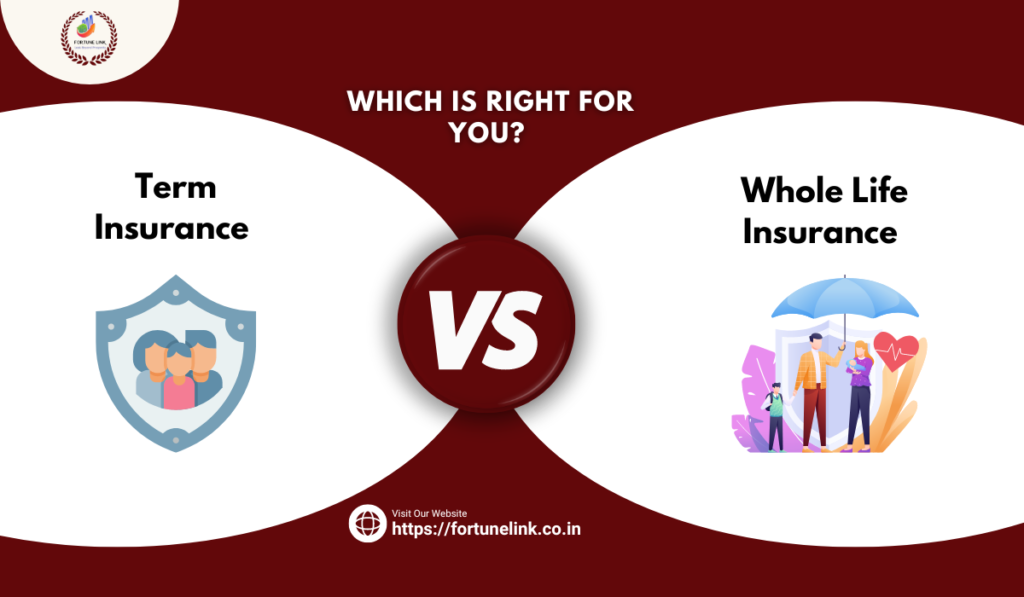
When it comes to securing your financial future and protecting your loved ones, choosing the right life insurance policy is crucial. Two of the most common types of life insurance are term insurance and whole life insurance. Understanding the differences between these two can help you make an informed decision that best suits your needs and financial goals.
What is Term Insurance?
Term insurance is a straightforward and affordable type of life insurance that provides coverage for a specific period, usually ranging from 10 to 30 years. If the policyholder passes away during the term, the beneficiaries receive a death benefit. However, if the policyholder outlives the term, the coverage ends, and no benefits are paid out.
Key Features of Term Insurance:
Affordable Premiums: Term insurance generally has lower premiums compared to whole life insurance, making it an attractive option for individuals seeking substantial coverage at a lower cost.
Fixed Term: Coverage lasts for a predetermined period. This can be advantageous if you need insurance for a specific time frame, such as until your children are financially independent or your mortgage is paid off.
Simplicity: Term insurance is easy to understand and straightforward, with no investment component or cash value accumulation.
What is Whole Life Insurance
Whole life insurance is a type of permanent life insurance that provides coverage for the policyholder’s entire lifetime, as long as premiums are paid. In addition to the death benefit, whole life insurance includes a cash value component that grows over time and can be borrowed against or withdrawn.
Key Features of Whole Life Insurance:
Lifetime Coverage: Whole life insurance covers you for your entire life, ensuring that your beneficiaries will receive a death benefit regardless of when you pass away.
Cash Value Accumulation: A portion of your premium goes into a cash value account that grows tax-deferred. This can be accessed during your lifetime for various financial needs.
Fixed Premiums: Premiums remain constant throughout the life of the policy, providing predictability in your financial planning.
Comparing Term Insurance and Whole Life Insurance
Cost:
Term Insurance: Typically more affordable with lower premiums.
Whole Life Insurance: Higher premiums due to lifetime coverage and cash value component.
Duration of Coverage:
Term Insurance: Limited to the policy term (e.g., 10, 20, 30 years).
Whole Life Insurance: Permanent coverage that lasts a lifetime.
Cash Value:
Term Insurance: No cash value; purely a death benefit.
Whole Life Insurance: Builds cash value over time, which can be borrowed against or withdrawn.
Flexibility:
Term Insurance: Less flexible; primarily focused on providing death benefit.
Whole Life Insurance: More flexible due to cash value and lifetime coverage.
Which One is Right for You?
The choice between term insurance and whole life insurance depends on your financial goals, budget, and personal circumstances. Here are some factors to consider:
Budget Constraints: If affordability is a primary concern, term insurance may be the better option due to its lower premiums.
Coverage Needs: If you need coverage for a specific period (e.g., until your children are grown or your mortgage is paid off), term insurance is likely sufficient.
Long-Term Planning: If you’re looking for lifelong coverage and an investment component, whole life insurance could be a better fit.
Estate Planning: Whole life insurance can be advantageous for estate planning purposes, providing a guaranteed death benefit and cash value accumulation.
Conclusion
Choosing between term insurance and whole life insurance is a significant decision that should align with your financial goals and personal needs. Term insurance offers affordability and simplicity for temporary coverage needs, while whole life insurance provides lifetime coverage and cash value growth for long-term financial planning. Consider your budget, coverage needs, and future financial goals when deciding which type of policy is right for you. Consulting with a financial advisor can also provide personalized guidance to help you make the best choice.
Visit for more information – https://fortunelink.co.in
Call – Phone: 9503424196


 Next Post
Next Post